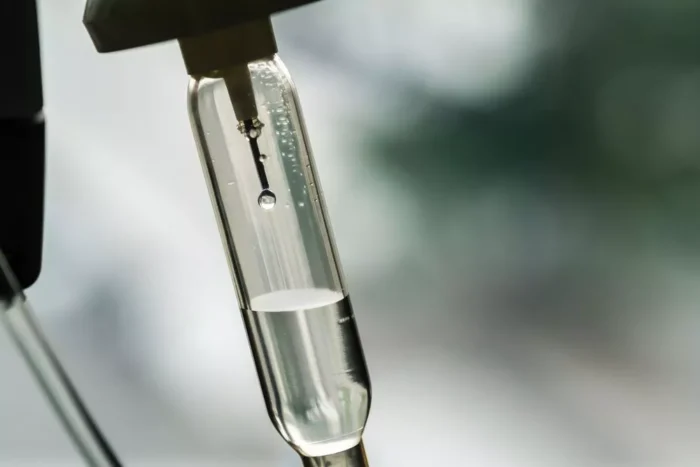
Hangovers are no fun, and they can really put a damper on your day; when it comes to getting rid of a hangover, people follow many different ways. Some people drink lots of water, some eat lots of greasy food, and some get IV fluid drip. But what is the best IV solution for a hangover? Is there even such a thing?
In this article, we will explore the available fluids and find out which is the best for getting rid of a hangover. From saline to vitamin C, we will cover all of the bases so that you can make an informed decision next time you reach for an IV bag.
Symptoms of a Hangover

A hangover is the experience of various unpleasant physical and mental symptoms after consuming alcohol. The severity of a hangover depends on many factors, including how much alcohol was consumed, the type of alcohol consumed, and the individual’s tolerance to alcohol.
Hangovers can occur after drinking any alcohol, but they are most commonly experienced after a night of heavy drinking. Symptoms of a hangover can include headache, fatigue, thirst, nausea, stomach pain, sensitivity to light and sound, and difficulty concentrating. Hangovers can last for several hours or even days and can be very debilitating. In severe cases, hangovers can lead to vomiting and dehydration.
If you’re experiencing any of these symptoms after a night of drinking, it’s best to rest, drink plenty of fluids, and eat healthy foods. There are also various over-the-counter and prescription medications that can help alleviate hangover symptoms.
Causes of a Hangover
Hangovers are caused by a combination of factors, including dehydration, inflammation, and the toxic effects of alcohol.
- Dehydration: Alcohol is a diuretic, which means it causes your body to lose fluids. This can lead to dehydration, which can cause headaches, thirst, dry mouth, and fatigue.
- Inflammation: Alcohol can cause inflammation of the stomach lining, leading to stomach pain and nausea.
- Toxic effects of alcohol: Alcohol is a toxin that can cause vomiting, headache, and decreased blood sugar.
These are just a few of the possible causes of a hangover. If you drink alcohol, it’s essential to stay hydrated and to drink in moderation. If you’re experiencing severe hangover symptoms, it’s best to see a doctor.
How Can IV Fluids Help?

Intravenous (IV) fluids are a type of medication that is delivered directly into the veins. They can be used to treat various conditions, including dehydration, allergies, and even some forms of cancer, and to help improve the symptoms of conditions like congestive heart failure, kidney disease, and liver disease.
They are composed of water and other electrolytes, such as sodium and potassium. IV fluids can also contain glucose, a type of sugar typically used when oral solutions are not enough to treat a condition. These fluids are also used to prevent dehydration in people who are unable to take in orally.
Hangover IV fluids are usually given through a catheter, a small tube inserted into the veins, and can also be given through a needle.
The type of IV fluid used will depend on a person’s condition, age, and whether they have allergies to any medications. The most common type of IV fluid is saline, which contains salt and water. Some emesis sacks also contain glucose or other nutrients such as proteins.
People with diabetes may need insulin if given an IV with glucose in it. Other types of solutions may also be used to treat specific conditions. For example, people with kidney failure may need dialysis fluid, while those with dehydration may need fluids containing electrolytes.
Which IV Fluids Are The Best for a Hangover?
Many different IV fluids are available, but which ones are the best for a hangover? The answer may depend on the individual, but a few IV fluids are often recommended for hangovers.
One of the most popular IV fluids for hangovers is saline. Saline is a simple salt water solution that helps to hydrate the body and replenish electrolytes. It is also often used to treat dehydration.
Another IV fluid that is sometimes recommended for hangovers is vitamin C. Vitamin C is a powerful antioxidant that helps to reduce inflammation and swelling. It can also help to boost the immune system.
Lastly, some people also recommend B-complex vitamins for a hangover. B-vitamins are essential for energy production and metabolism. They can also help to reduce fatigue and improve cognitive function.
How To Get An IV?

If you need to get an IV, you should know a few things. First, you will need to find a vein. This can be done by feel, or you can use a tourniquet to help you find a vein. Once you have found a vein, you need to clean the area around the vein with an alcohol swab.
Next, you will need to insert the needle into the vein. You will want to angle the needle up at about 45 degrees. Once the needle is in the vein, you will need to attach the IV tubing to the needle.
Once the tubing is attached, you need to tighten the tourniquet and open the clamp on the IV tubing. This will allow the fluid to flow into your vein.
Once the IV is in place, you will need to tape it down so that it does not fall out. You will also want to check the IV frequently to ensure it is in place and working correctly.
Conclusion
There are a variety of IV fluids that can be used to treat a hangover. The best IV fluid for a hangover depends on the severity of the symptoms and the underlying cause. If the hangover is caused by dehydration, then a saline solution may be the best option. If an electrolyte imbalance causes the hangover, a potassium-rich IV fluid may be the best option. If you are tired and run down, vitamin-rich IV fluid may be a better choice. Speak to a medical professional to determine the best IV fluid for your hangover.








